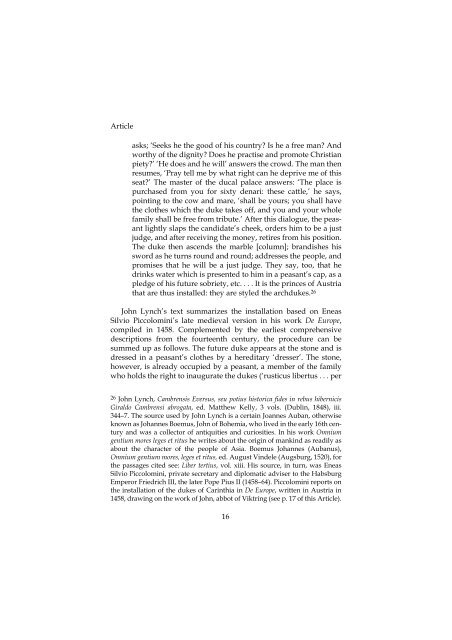The Power of Weakness: Machiavelli Revisited - German Historical ...
The Power of Weakness: Machiavelli Revisited - German Historical ...
The Power of Weakness: Machiavelli Revisited - German Historical ...
You also want an ePaper? Increase the reach of your titles
YUMPU automatically turns print PDFs into web optimized ePapers that Google loves.
Article<br />
asks; ‘Seeks he the good <strong>of</strong> his country? Is he a free man? And<br />
worthy <strong>of</strong> the dignity? Does he practise and promote Christian<br />
piety?’ ‘He does and he will’ answers the crowd. <strong>The</strong> man then<br />
resumes, ‘Pray tell me by what right can he deprive me <strong>of</strong> this<br />
seat?’ <strong>The</strong> master <strong>of</strong> the ducal palace answers: ‘<strong>The</strong> place is<br />
purchased from you for sixty denari: these cattle,’ he says,<br />
pointing to the cow and mare, ‘shall be yours; you shall have<br />
the clothes which the duke takes <strong>of</strong>f, and you and your whole<br />
family shall be free from tribute.’ After this dialogue, the peasant<br />
lightly slaps the candidate’s cheek, orders him to be a just<br />
judge, and after receiving the money, retires from his position.<br />
<strong>The</strong> duke then ascends the marble [column]; brandishes his<br />
sword as he turns round and round; addresses the people, and<br />
promises that he will be a just judge. <strong>The</strong>y say, too, that he<br />
drinks water which is presented to him in a peasant’s cap, as a<br />
pledge <strong>of</strong> his future sobriety, etc. . . . It is the princes <strong>of</strong> Austria<br />
that are thus installed: they are styled the archdukes. 26<br />
John Lynch’s text summarizes the installation based on Eneas<br />
Silvio Piccolomini’s late medieval version in his work De Europe,<br />
compiled in 1458. Complemented by the earliest comprehensive<br />
descriptions from the fourteenth century, the procedure can be<br />
summed up as follows. <strong>The</strong> future duke appears at the stone and is<br />
dressed in a peasant’s clothes by a hereditary ‘dresser’. <strong>The</strong> stone,<br />
however, is already occupied by a peasant, a member <strong>of</strong> the family<br />
who holds the right to inaugurate the dukes (‘rusticus libertus . . . per<br />
26 John Lynch, Cambrensis Eversus, seu potius historica fides in rebus hibernicis<br />
Giraldo Cambrensi abrogata, ed. Matthew Kelly, 3 vols. (Dublin, 1848), iii.<br />
344–7. <strong>The</strong> source used by John Lynch is a certain Joannes Auban, otherwise<br />
known as Johannes Boemus, John <strong>of</strong> Bohemia, who lived in the early 16th century<br />
and was a collector <strong>of</strong> antiquities and curiosities. In his work Omnium<br />
gentium mores leges et ritus he writes about the origin <strong>of</strong> mankind as readily as<br />
about the character <strong>of</strong> the people <strong>of</strong> Asia. Boemus Johannes (Aubanus),<br />
Omnium gentium mores, leges et ritus, ed. August Vindele (Augsburg, 1520), for<br />
the passages cited see: Liber tertius, vol. xiii. His source, in turn, was Eneas<br />
Silvio Piccolomini, private secretary and diplomatic adviser to the Habsburg<br />
Emperor Friedrich III, the later Pope Pius II (1458–64). Piccolomini reports on<br />
the installation <strong>of</strong> the dukes <strong>of</strong> Carinthia in De Europe, written in Austria in<br />
1458, drawing on the work <strong>of</strong> John, abbot <strong>of</strong> Viktring (see p. 17 <strong>of</strong> this Article).<br />
16













